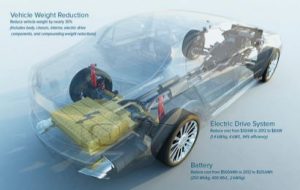by Jon LeSage, editor and publisher, Green Auto Market
Here’s my take on the six most significant and interesting occurrences during the past week…….
 DOE $55M in Grants: General Motors won a nearly $4 million award from the U.S. Dept. of Energy’s funding of clean vehicle technologies. The GM project “will research, develop, and demonstrate a highly integrated wide bandgap power module for next generation plug-in vehicles.” It’s one of 24 projects awarded nearly $55 million in the DOE funding round designed to strengthen the U.S. clean energy economy, reduce petroleum consumption, and support the agency’s EV Everywhere Grand Challenge to make electric vehicles as cost competitive as traditional internal combustion engine vehicles by 2022. The biggest grant award went to Cummins Inc. – $4.5 million for its Cummins SuperTruck program. Through the Advanced Vehicle Power Technology Alliance with the DOE, the Department of the Army is contributing an additional $2.26 million in co-funding to support projects focused on battery modeling technologies and computational fluid dynamics.
DOE $55M in Grants: General Motors won a nearly $4 million award from the U.S. Dept. of Energy’s funding of clean vehicle technologies. The GM project “will research, develop, and demonstrate a highly integrated wide bandgap power module for next generation plug-in vehicles.” It’s one of 24 projects awarded nearly $55 million in the DOE funding round designed to strengthen the U.S. clean energy economy, reduce petroleum consumption, and support the agency’s EV Everywhere Grand Challenge to make electric vehicles as cost competitive as traditional internal combustion engine vehicles by 2022. The biggest grant award went to Cummins Inc. – $4.5 million for its Cummins SuperTruck program. Through the Advanced Vehicle Power Technology Alliance with the DOE, the Department of the Army is contributing an additional $2.26 million in co-funding to support projects focused on battery modeling technologies and computational fluid dynamics.- State reaffirms commitment to low carbon: The California Air Resources Board voted Friday to readopt its low-carbon fuel standard; the action was taken in the wake of the ambitious petroleum reduction mandate being cut from the state’s clean energy bill. It will require California to achieve at least a 10% cut in the carbon intensity of transportation fuels by 2020. CALSTART lauded CARB’s strong support for low carbon fuels. “The Low Carbon Fuel Standard requires fuel producers to innovate and invest in cleaner fuels. Because of strong policy direction, a number of California industries have been doing their part – now it’s time for the oil industry to do its fair share. Today’s action by the Air Resources Board will spur investment and encourage job growth in California, enabling the development of fuels we can truly live with for decades to come,” said John Boesel, President and CEO of CALSTART.
- Carsharing is taking off: Interested in reading more about ridesharing giant Uber? Don’t forget how much carsharing is expanding, says a new report. According to Navigant Research, global carsharing services revenue is expected to grow from $1.1 billion in 2015 to $6.5 billion in 2024. The success of one-way carsharing services is prompting more companies to consider offering this service model (which Daimler’s Car2Go is finding out). Carsharing members can use one-way carsharing for shorter, spur of the moment trips. Automakers have entered this market with good results, building substantial membership levels in only a few years, according to the Navigant report. In related news, Zipcar said it will be launching its car-sharing service on 100 additional colleges and universities nationwide by the end of 2015.
- Dealers sue VW: Independent, used car dealerships sued Volkswagen in California last week for the losses they expect to take with the “clean diesel” scandal. Dealers sued over losses they say they will incur following revelations that the company fitted some diesel models with software to cheat on U.S. Environmental Protection Agency vehicle emissions tests. The proposed class action was filed in California federal court on behalf of independent car dealers in the state and seeks damages likely to exceed $1 million.
- China and U.S. make carbon deal: The U.S. and China are moving forward on their 2014 agreement to reduce carbon emissions. During President Xi’s visit to Washington, D.C., the U.S and China released a U.S.-China Joint Presidential Statement on Climate Change that will affect transportation, energy, and construction. The partners will develop collaborative Electric Vehicle (EV) Interoperability Centers with the goal of coordinating relative technical standards, promoting coordination, and providing technical support to the existing, successful electric vehicle work between the two countries. The U.S. and China are also committing to finalize respective next-stage fuel efficiency standards for heavy-duty vehicles in 2016, and both countries are committing to implement them in 2019.
- Autonomous-capable vehicle forecast: Navigant Research has come up with a good tag name for self-driving vehicles – “autonomous-capable vehicles.” Advanced driver assistance features are bringing semi-autonomous driving features under specific circumstances to current vehicles and soon-to-be released models. Cars will soon have the ability to cruise on freeways and safely navigate traffic jams with minimal driver input. The research firm thinks that 85 million autonomous-capable vehicles are expected to be sold annually around the world by 2035. Improvements in traffic flow in a city are a key reason for continuing advancements in autonomous-capable vehicles, says Dave Alexander, senior research analyst with Navigant Research.



